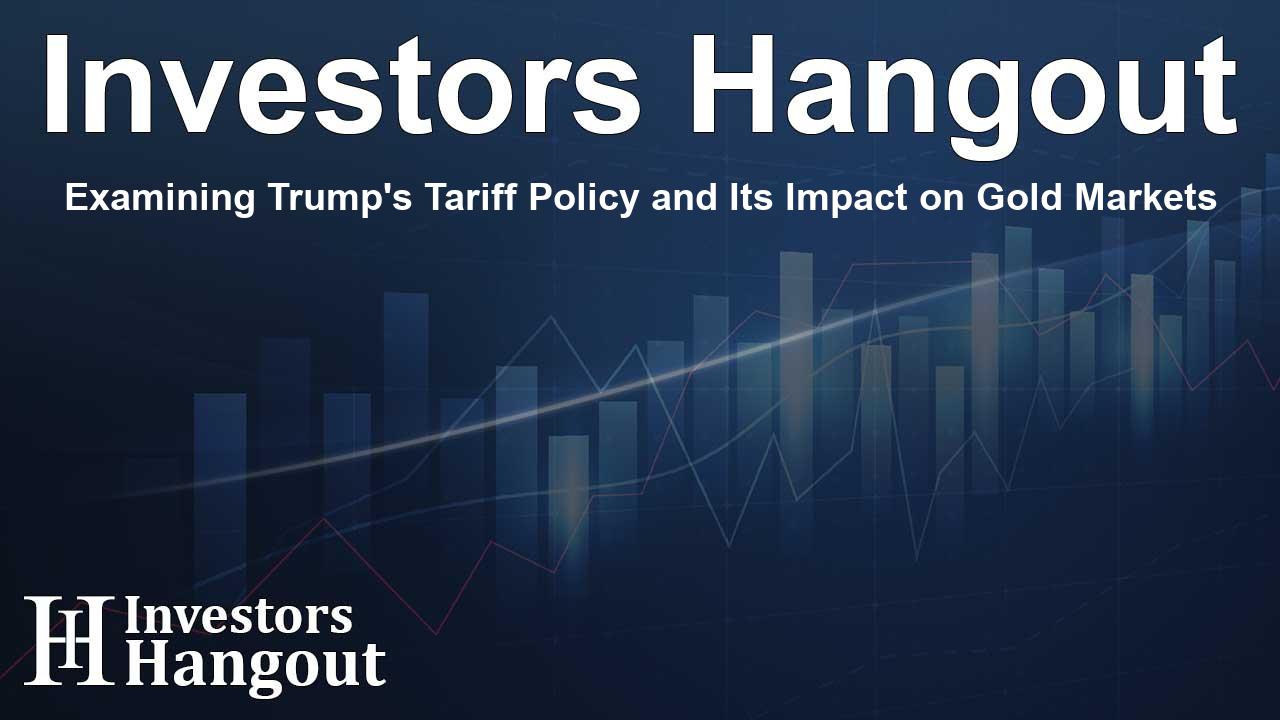Examining Trump's Tariff Policy and Its Impact on Gold Markets

Understanding Tariffs and Their Economic Implications
In the historical context, tariffs played a critical role in funding government operations in the United States before income tax was introduced. For instance, prior to 1913, a significant portion of the government's revenue came from tariffs and excise taxes. Many today question whether a return to this system, substituting tariffs for income tax, could yield positive outcomes. Some economic analysts, including Doug Casey, have posited that if implemented with a substantially reduced government scope—cutting spending by 80% to 90%—such a shift could bring certain advantages. However, there is skepticism regarding the likelihood of this reduction happening.
The Dynamics of Tariff Implementation
Transitioning entirely to a tariff-based revenue model is an ambitious and complex idea. Currently, the U.S. government operates on vast spending, topping $6.75 trillion annually, yet only manages to collect about $4.9 trillion, necessitating the creation of money to bridge the gap. This raises fundamental concerns regarding whether tariffs could feasibly cover this deficit. Presently, the government's revenue from tariffs is minimal—around $80 billion from nearly $4 trillion in imports. Increasing tariffs dramatically could lead to unintended economic repercussions, such as declining imports and a decrease in revenue, contrary to the intended outcomes.
Potential Consequences for International Trade
Historically, heightened tariffs have the potential to derail international trade relationships, as seen during the Smoot-Hawley Tariff of 1929, which worsened the Great Depression. Doug Casey emphasizes that tariff proposals could harm foreign and domestic businesses alike, contradicting Trump's proclamations of fostering economic growth through protectionist measures. This could lead to upheaval in cross-border trade dynamics, compelling countries to retaliate with their tariffs, resulting in an escalation of economic conflicts.
The Bigger Picture: Tariffs vs. Deregulation
While the use of tariffs as a revenue-generating tactic garners attention, Casey argues that the more progressive approach would be fostering deregulation to enhance the economic environment. Badly designed tariffs could hurt the consumer base, as higher tariffs typically mean higher prices for imports, impacting the overall standard of living. Conversely, deregulating and significantly reducing government expenditures could bolster economic prosperity. In this light, Trump's actions focused on decreasing regulatory barriers are encouraging, although their effectiveness is uncertain if coupled with aggressive tariff policies.
The Ripple Effect on the Gold Market
An increase in tariffs may also have noticeable effects on the gold market. Recent observations indicate that gold demand has surged, driven by fears related to tariff implications on the economy. Investors are converging around gold, given its historical role as a safe-haven asset amidst economic turbulence. As it stands, many institutions are shifting gold from London to New York, signaling a potential new wave of interest and investment in gold commodities.
Market Reactions and Speculation
The gold market may undergo considerable shifts if tariffs bring about higher inflation and depreciated currency values. As governmental controls tighten, the dynamics of gold and its availability may change. Speculators and investors must remain alert and adaptable, not just for gold but for the overall market response to ongoing tariff adjustments. Holding onto physical gold or precious metals may become increasingly critical as uncertainties in government policies multiply.
Preparing for Market Changes
In response to the evolving landscape wrought by tariffs and potential retaliatory measures, experts recommend maintaining liquidity while monitoring the state of international trade. Having tangible assets, like gold and silver, might serve as a protective strategy against forthcoming economic shocks. The key is to avoid reliance on paper assets, which could falter as government interventions become more drastic.
Frequently Asked Questions
What are tariffs, and how do they work?
Tariffs are taxes imposed on imported goods. They are intended to make foreign products less competitive compared to domestic products, ideally boosting local industry.
How could Trump's tariff policy affect the economy?
There are risks that it could lead to reduced international trade, higher prices for consumers, and potential retaliatory tariffs from other nations.
Why is gold considered a safe-haven asset?
Gold is traditionally seen as a safe-haven asset because it typically retains value or appreciates during times of economic uncertainty, making it a protective investment.
What are the historical impacts of high tariffs?
Historically, high tariffs can lead to economic downturns, as seen in the Great Depression, when such measures provoked widespread retaliation and reduced global trade.
How should investors prepare for changes in government policy?
Investors are advised to diversify their portfolios, maintain liquidity, and consider holding physical assets like gold to mitigate potential risks from government policy shifts.
About The Author
Contact Henry Turner privately here. Or send an email with ATTN: Henry Turner as the subject to contact@investorshangout.com.
About Investors Hangout
Investors Hangout is a leading online stock forum for financial discussion and learning, offering a wide range of free tools and resources. It draws in traders of all levels, who exchange market knowledge, investigate trading tactics, and keep an eye on industry developments in real time. Featuring financial articles, stock message boards, quotes, charts, company profiles, and live news updates. Through cooperative learning and a wealth of informational resources, it helps users from novices creating their first portfolios to experts honing their techniques. Join Investors Hangout today: https://investorshangout.com/
The content of this article is based on factual, publicly available information and does not represent legal, financial, or investment advice. Investors Hangout does not offer financial advice, and the author is not a licensed financial advisor. Consult a qualified advisor before making any financial or investment decisions based on this article. This article should not be considered advice to purchase, sell, or hold any securities or other investments. If any of the material provided here is inaccurate, please contact us for corrections.
